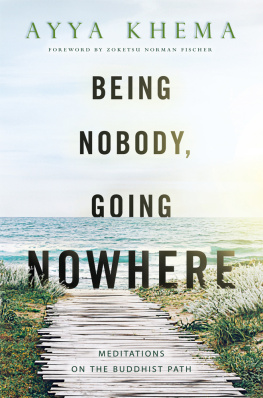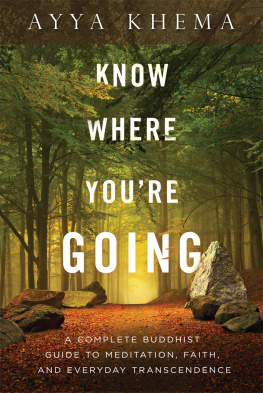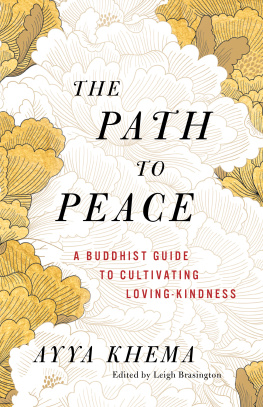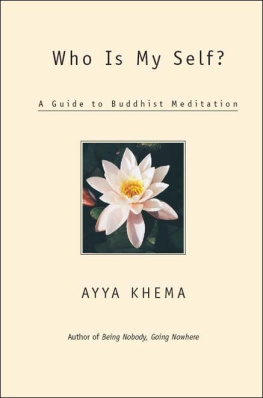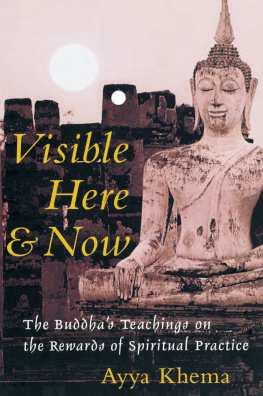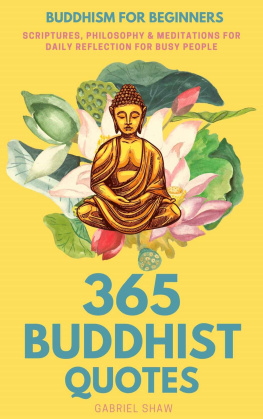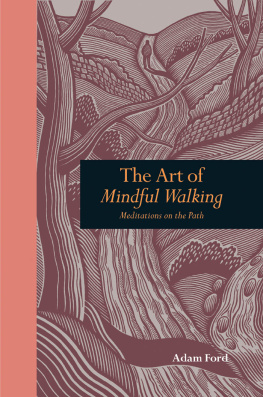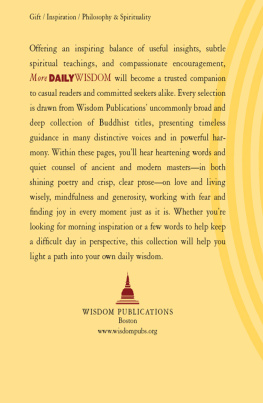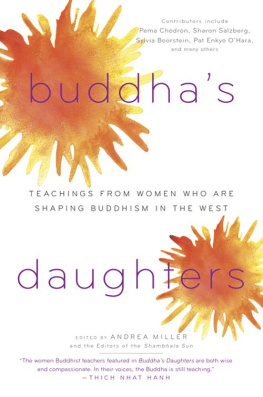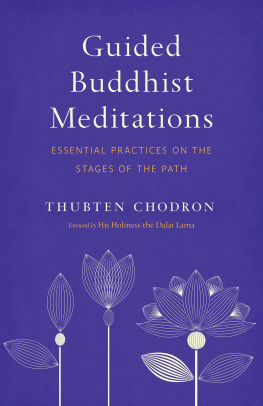Ayya Khema - Being Nobody, Going Nowhere: Meditations on the Buddhist Path
Here you can read online Ayya Khema - Being Nobody, Going Nowhere: Meditations on the Buddhist Path full text of the book (entire story) in english for free. Download pdf and epub, get meaning, cover and reviews about this ebook. year: 2016, publisher: Wisdom Publications, genre: Religion. Description of the work, (preface) as well as reviews are available. Best literature library LitArk.com created for fans of good reading and offers a wide selection of genres:
Romance novel
Science fiction
Adventure
Detective
Science
History
Home and family
Prose
Art
Politics
Computer
Non-fiction
Religion
Business
Children
Humor
Choose a favorite category and find really read worthwhile books. Enjoy immersion in the world of imagination, feel the emotions of the characters or learn something new for yourself, make an fascinating discovery.
- Book:Being Nobody, Going Nowhere: Meditations on the Buddhist Path
- Author:
- Publisher:Wisdom Publications
- Genre:
- Year:2016
- Rating:3 / 5
- Favourites:Add to favourites
- Your mark:
- 60
- 1
- 2
- 3
- 4
- 5
Being Nobody, Going Nowhere: Meditations on the Buddhist Path: summary, description and annotation
We offer to read an annotation, description, summary or preface (depends on what the author of the book "Being Nobody, Going Nowhere: Meditations on the Buddhist Path" wrote himself). If you haven't found the necessary information about the book — write in the comments, we will try to find it.
Ayya Khema: author's other books
Who wrote Being Nobody, Going Nowhere: Meditations on the Buddhist Path? Find out the surname, the name of the author of the book and a list of all author's works by series.
Being Nobody, Going Nowhere: Meditations on the Buddhist Path — read online for free the complete book (whole text) full work
Below is the text of the book, divided by pages. System saving the place of the last page read, allows you to conveniently read the book "Being Nobody, Going Nowhere: Meditations on the Buddhist Path" online for free, without having to search again every time where you left off. Put a bookmark, and you can go to the page where you finished reading at any time.
Font size:
Interval:
Bookmark:

BEING NOBODY, GOING NOWHERE
Meditations on the Buddhist Path

Winner of the CHRISTMAS HUMPHREYS AWARD for BEST INTRODUCTORY BUDDHIST BOOK
IN THIS LUCID CLASSIC, BELOVED TEACHER AYYA KHEMA INTRODUCES US to the essence of the Buddhist path. She addresses the how and why of meditation, providing a clear framework for understanding the nature of karma and rebirth and the entirety of the eightfold path. With specific, practical advice, Ayya Khema illuminates the practices of compassion and sympathetic joy and offers forthright guidance in working with the hindrances that we all encounter in meditation. Few introductory books are both simple and profound Being Nobody, Going Nowhere is both.
Refreshingly direct explication of the fundamentals of Buddhism and no-nonsense instructions on how to apply these great truths in our daily lives.
Sandy Boucher, author of Hidden Spring
This book is a valuable guide to the path of meditative insight and loving compassion. It is direct, clear, and inspiring.
Sharon Salzberg, author of Lovingkindness
Not just highly recommended but essential reading.
The Middle Way
Born in Berlin in 1923 to Jewish parents, AYYA KHEMA was educated in Scotland and China and later emigrated to the United States. She was ordained as a nun in Sri Lanka in 1979 and established several Buddhist centers, including Wat Buddha Dhamma in Australia, Parapuddua Nuns Island in Sri Lanka, and Buddha-Haus in Germany. She is the bestselling author of twenty-five books including Know Where Youre Going and Be An Island. She passed away in 1997.
CONTENTS
FOREWORD
A YYA KHEMA WAS A VERY UNLIKELY PERSON. A round little woman with a large-featured face topped with a carpet of close-cropped snow white hair, she embodied naturally and oddly all the contradictions of the twentieth century. She was an internationally known Buddhist teacher, and also a Jew who fled Nazi Germany. She was a San Diego housewife and grandmother, and also the founder of Dharma centers on several continents. She was a wandering hippie-vegetarian mom who had traveled all over the world in her Landrover. But she was also one of the few fully ordained Western Buddhist nuns and wrote scores of books on Buddhist meditation. Despite all this, in person, she was not awe inspiring. I think she did not see herself that way, and she did nothing to create an aura around her, although she was never shy about acknowledging her spiritual accomplishments. I always enjoyed her company and felt happy in her presence. Although she was my mothers age, she reminded me of my grandmother, another small round woman from Europe who had seen the world turn upside down. Maybe it was because of all this contradiction, all this breadth of living, that she seemed immune to the snares of orthodoxy and idealism that religious practitioners so often fall prey to. She had an enormous quality of cutting through: cutting through flattery, cutting through preconceptions, cutting through confusion, doctrine, desire, verbiage, complications. Maybe it takes a grandmother, a holocaust survivor, to appreciate whats really important and necessary for our lives, without sidetracks. Theravada Buddhism, with its practical emphasis on happiness, liberation from suffering, and technical path, was Ayyas perfect vehicle. She seemed made for it.
The Western Buddhist movement is already several steps down the road from its naive beginnings, in which alienated Westerners strove mightily to replace their own painful conditioning with an idealized Asian perspective. Along the way, many complications have necessarily been introduced. How could they not be? Along with an ever increasing body of new translations of and commentaries on traditional teachings, we have also now a considerable body of interpretative and critical material, so that now there is no Western Buddhism without reference to psychology, ecology, feminism, social action, science, critical philosophy, all our postmodern insight and trouble.
While I am sure that all of this is necessary and helpful, it also makes things murky sometimes. Ayya was never murky. She was definite, clear, precise, discriminating, and she had very little patience for anything extra. I think she felt she did not have the time for it. Certainly she had no interest. Having seen and suffered as much as she had, with such a cheerful and enduring spirit, she just wanted to get on with things. She always cut to the chase, without whining or poetic elaboration. Her teaching was pungent and to the point, as this book attests. Here she takes up the most important basic teachings in a fresh and direct way, without traditional trappings, but with the original spirit intact: What does this actually mean? How can it actually help? In what way can it be put into practice? To protestations of the difficulty and hardship of practice Ayya always responds, Its simple; its clear; you can do it. Yes it takes discipline; yes you have to be serious theres no escape from that. But you can do it, and when you do, you will be grateful for it.
I met Ayya late in her life, when she already had cancer and knew her days were numbered. She spoke about this, as about almost anything that would come up in conversation, freely and without mysteriousness. Death would be fine when it came; there was no problem about that. And meanwhile there was much work to be done. Peacefully and without worry. Why Dharma students were so complicated and confused about so many things she simply could not understand. She was patient with it but I think never stopped marveling at it, uncomprehendingly. The teachings are so clear and straightforward, so easy to put into practice. What is all this fuss about?
Ayya was a person who had, by force of circumstances, always moved on. Because of this she had had from her earliest years, a powerful appreciation of impermanence and nonattachment. She embodied these qualities authentically and spoke of them convincingly. Even after her ordination as a nun and her establishment as a teacher, she continued to be a person on the move, always on to the next event, the next place, the next student, the next teaching, the next moment. That she is gone now is therefore no surprise and no tragedy. She saw leaving simply as the next step in the process. We, who do not yet seem to be gone, are lucky to have her written teachings, which are so useful and so bracing. Through them her voice lives on.
Zoketsu Norman Fischer
San Francisco, California
PREFACE
T HIS IS A SIMPLE BOOK for ordinary people who want to find greater happiness and contentment in their lives by following a spiritual path. The Buddhas path is simple and meant for ordinary people; anyone with goodwill and determination can follow its steps toward freedom of heart and mind. Both heart and mind have to be involved in this journey toward liberation from the self. The mind understands and concludes, connects and discerns, whereas the heart feels.
When our feelings become free of emotional reactions and dwell in love and compassion as their natural abode, our mind will be open to the great truths of universal significance. And the more we refer to these truths, the closer we will get to spiritual emancipation. Hopefully this book can help to point out some steps on the way, according to the Buddhas teaching, and facilitate the journey.
A ten-day meditation course in Kundasale, Sri Lanka, was the venue for the talks that are published here. Although my name appears as the author, this book could never have been assembled without the help and support of many people, each making their own special contribution.
Next pageFont size:
Interval:
Bookmark:
Similar books «Being Nobody, Going Nowhere: Meditations on the Buddhist Path»
Look at similar books to Being Nobody, Going Nowhere: Meditations on the Buddhist Path. We have selected literature similar in name and meaning in the hope of providing readers with more options to find new, interesting, not yet read works.
Discussion, reviews of the book Being Nobody, Going Nowhere: Meditations on the Buddhist Path and just readers' own opinions. Leave your comments, write what you think about the work, its meaning or the main characters. Specify what exactly you liked and what you didn't like, and why you think so.

